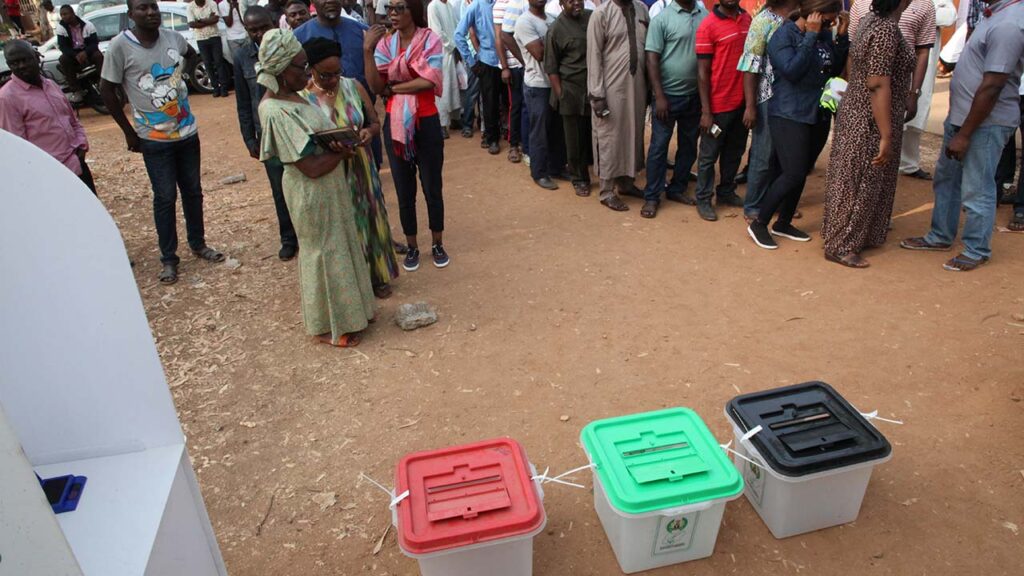The Centre for Democracy and Development, a political think tank, expressed doubts on Saturday about the validity of the governorship election, citing allegations of vote-buying in the open, violence, and intimidation.
The organization says that even though the Independent National Electoral Commission performed better in the area of logistics deployment resulting in the prompt arrival of electoral officials, it also notes that there were occasionally problems with the Bi-modal Voters Accreditation System’s non-functionality.
In its preliminary statement on the governorship and State Houses of Assembly elections, the CDD brought up the issues, according to Idayat Hassan, its Executive Director.
According to information gathered by its 1,500 observers stationed across the nation, there were more instances of vote-buying during the governorship election than there were during the presidential election on February 25.
This reality, in her opinion, pervaded all six geopolitical zones.
Hassan said, “In the North-West, observers in all seven states reported increased reports of vote trading, primarily by political party agents. Money was used alongside other materials such as food items, wrappers and ‘credit voucher,’ and those items would be redeemed after the results.
“Similarly in the North East, political party agents in Taraba infiltrated the queue, pretended to be voters and used the chance to offer cash for votes.
“In the South-East, there were reports of APGA and LP party agents using materials, phones and other souvenirs to entice voters in Anambra State.
“In the South-South, multiple states reported a desire for voters to show proof of their vote before being paid, with party agents reportedly compiling a list of their voters in Esan Central LGA, Edo state.
“This might be a reflection of the heightened political environment around governorship polls, the importance of local personalities in state-level politics, and the shortages of fuel and Naira.”
Speaking on the incidents of violence, the pro-democracy organization said the cases reinforced the heightened political environment that the polls had been conducted in.
According to Hassan, these acts of violence involved party agents and politically sponsored thugs.
She also said, “A concern that has cut across multiple zones is the reduced presence of security officials. Observers across the states in the south-south, South West and North West reported a much smaller security presence, especially when compared to the presidential election.
“This has led to repeated skirmishes and fights between voters, party agents and officials. For example, observers in Enugu reported clashes between party representatives, while others in Jigawa highlighted similar issues between self-professed party members.”
Consequently, the think-tank identified voter suppression as a major factor shaping the conduct of elections.
Furthermore, the CDD said thuggery was used to disrupt the process.
“There were reports in Ukanafun LGA, Akwa Ibom, where thugs attacked a polling unit and scared away voters. Election materials were also hijacked at gunpoint in Emelia LGA and thugs also disrupted the process in Obio Akpor LGA, both in Rivers State”, she said.
Weighing in on the role played by online falsehoods, CDD emphasized on how a flurry of voter intimidation video were widely circulating online as voters were heading to the polls, particularly in Lagos.
Speaking also, the Chairman of the CDD’s Election Analysis Centre, Prof. Adele Jinadu, said the turnout of voters for the polls varied from state to state based on anecdotal evidence.
He explained that in states where the incumbent was being significantly challenged by his opponent, relatively higher turnout of voters was experienced.
Jinadu added that CDD observation data indicated that in the south-south, the general sense of discouragement across the region that due to the unfavourable outcome of the presidential election affected turnout with voters declaring that ‘there is no point’ of coming out to vote.
He also said that CDD observer data showed that across the southwest zone INEC officials arrived on time and promptly commenced the process in over 80 per cent of observed polling units.
“This trend is broadly consistent across the six geo-political zones. In Anambra State 75 per cent of polling units had INEC officials who arrived on time with voting commencing on average at 8:41am.
“There was even a report of INEC officials in Benue state having slept over at the polling unit to avoid late coming,” he said.

